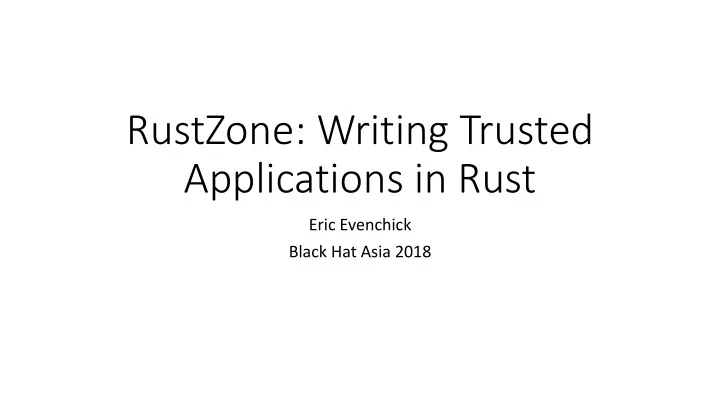

RustZone: Writing Trusted Applications in Rust Eric Evenchick Black Hat Asia 2018
About Me • Principal Research Consultant @ Atredis Partners • Founder, Developer of Open Source Hardware Things @ Linklayer Labs
Outline • Trusted Execution Environments • TrustZone • TEE Problems • Rust • Rust + TrustZone • Demo • Questions
Trusted Execution Environments
What? • An isolated environment within a processor for performing secure operations • Segmentation of code, data, and hardware access • Combination of hardware features and software
Today’s TEEs • Hardware: • AMD: Platform Security Processor • Intel: Trusted Execution Technology, Software Guard Extensions (SGX) • ARM: TrustZone • Software: • Trustonic Kinibi • Qualcomm QSEE • OP-TEE
Use Cases • Authentication • Android GateKeeper • Financial Applications • Secure Boot • DRM • WideVine • An additional layer of protection from the host OS • Protect the system from the user L
TrustZone
The TrustZone TEE • The ARM TEE • Normal and Secure Worlds • Normal World: Rich OS and applications (Linux, Android, QNX, etc…) • Secure World: Limited operating system and Trusted Applications • Processor can switch between two worlds • Configure processor to restrict access to resources
TrustZone in Practice http://genode.org/documentation/articles/trustzone
TEE Problems
TEE OS Protections • ASLR is Rare • No Stack Canaries or Guard Pages • Secure World has fewer protections than Normal World? • No High Level Language Support, we must write C!
Writing (good) C is Hard • Common Memory Problems • Buffer overflows • Use after free • Type Issues • Void means nothing, and everything! • Limited Help from Compiler • Programmers can do Silly Things • memcpy, strcpy, sprintf, etc…
Example: WideVine Trusted Application • DRM Implementation for Android • Undocumented Command with Buffer Overflow • End Result: Arbitrary Code Execution in Secure World • More info: http://bits- please.blogspot.ca/2016/05/qsee- privilege-escalation-vulnerability.html
Example: Samsung OTP Buffer Overflow • Service in Normal World to generate a One-Time Password (OTP) • Any user can access this service! • Trusted Application parses request leading to stack buffer overflow
Rust
What’s Rust? • New systems programming language • In development since 2010, sponsored by Mozilla • Works for embedded: • Works without libc • Compiles to bytecode • No garbage collection or runtime • Raw memory access
Why Rust? • Compile time memory safety checks • Memory ownership and borrow checking • Find bugs at compile time, not runtime • eg, match • Good tools, getting better • Great C Foreign Function Interface!
Rust / C FFI • Call C from Rust and Call Rust from C • Need unsafe blocks for: 1. Dereferencing a raw pointer 2. Calling an unsafe function or method 3. Accessing or modifying a mutable static variable 4. Implementing an unsafe trait • Goal: limit unsafe code
Learning Rust • The Rust Book: https://doc.rust-lang.org/book/ • Paper version soon: https://nostarch.com/Rust • Rust by Example: https://rustbyexample.com/ • Julia Evans’ Blog: https://jvns.ca/categories/rust/
Rust + TrustZone
Step 1: Get an OS • Need an OS to run in the Secure World • OP-TEE • Free and Open Source • Implementations for many platforms, including QEMU • Well Documented • https://www.op-tee.org/
Step 2: Generate Rust Bindings • We need Rust bindings for OP-TEE’s API • bindgen to the rescue! void TEE_MACInit( TEE_OperationHandle operation, const void *IV, uint32_t IVLen); bindgen extern "C" { pub fn TEE_MACInit(operation: TEE_OperationHandle, IV: *const c_types::c_void, IVLen: u32); }
Step 3: Write a Rust Library • Yes, a library . • Need to implement 5 functions: • TA_CreateEntryPoint • TA_DestroyEntryPoint • TA_OpenSessionEntryPoint • TA_CloseSessionEntryPoint • TA_InvokeCommandEntryPoint
Step 3: Write a Rust Library pub fn InvokeCommandEntryPoint(_sessionContext: * mut c_types::c_void, commandID: u32 , _paramTypes: u32 , params: & mut [optee::TEE_Param; 4 ]) -> optee::TEE_Result { ta_print!("Rust TA InvokeCommandEntryPoint"); match commandID { 0 => { unsafe {params[ 0 ].value.as_mut().a += 1 }; ta_print!("Incremented Value"); }, 1 => { unsafe {params[ 0 ].value.as_mut().a -= 1 }; ta_print!("Decremented Value"); }, _ => { return optee::TEE_ERROR_BAD_PARAMETERS; } } return optee::TEE_SUCCESS; }
Step 4: Compile, Link, Sign Compiled Rust Library Compiled TA Linker TA ELF sign.py Header libutee, libmpa, libutil OP-TEE Linker Signed TA Script
Demo
Conclusions
Conclusions • TEEs are useful, but have the usual issues • Rust is an potential replacement for C with some added benefits • Should you write your Trusted Applications in Rust?
Thanks! Questions? eric@evenchick.com @ericevenchick https://github.com/ericevenchick/rustzone
Recommend
More recommend